HIT CHANNEL EXCLUSIVE INTERVIEW: September 2015. We had the great honour to talk with a legendary guitarist: Larry Coryell. He is best known as a jazz fusion pioneer and has been a member of The Free Spirits and The Eleventh House. Also, he has played with Charles Mingus, Jimi Hendrix, Gary Burton, John McLaughlin , Billy Cobham , Paco De Lucia, Chick Corea, Chico Hamilton, Chet Baker, Steve Marcus, Steve Khan, Alphonse Mouzon, Lenny White and many others. He just released “Aurora Coryellis”, a 3CD box of live recordings. Read below the very interesting things that Larry told us:
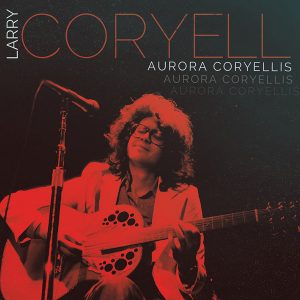 Are you satisfied with the quality of the live material contained on “Aurora Coryellis” box-set?
Are you satisfied with the quality of the live material contained on “Aurora Coryellis” box-set?
Yes, I am. It’s not a normal professional studio quality recording. These recordings are taken from live performances. It’s not always as clean and polished as you did in a studio recording, but I felt that the music –because it was done in front of people- had more life to it. So, it seems to go in that direction.
You will play two concerts in Dublin and Belfast in a few days. What fans should expect from these shows?
One show will be with my normal trio like the trio setting that we have included in “Aurora Coryellis”; the trio with Paul Wertico (drums) and Jeff Chambers (bass). That will be one set of music. That’s in Dublin (ed: Sept 13). In Belfast (ed: Sept 16), we are going to play a tribute to the late Emily Remler, the guitarist with whom I had a collaboration in 1985. We have a special program of music of original compositions for two guitars and there is a young man who is going to play with me: His name is Peter Moc from Czech Republic, but he lives in Ireland now for some years and we are going to recreate some of the guitar duets that I did with Emily Remler.
Are you currently involved in other projects?
I wrote one opera in 2010 and it was performed at the end of 2014 and also in May of 2015, this year. Now, I am writing another opera. Both operas are based on books by Leo Tolstoy.
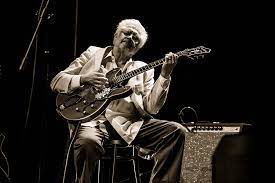 Are you proud of the classic album status that your “Spaces” (1970) album has?
Are you proud of the classic album status that your “Spaces” (1970) album has?
Yes, I have a lot of gratitude for that album. I had no idea that this record would be so famous and so important. I’m very grateful.
The Free Spirits played jazz fusion years before Miles Davis’ “Bitches Brew” album (1970). Had you realized then that the music of The Free Spirits was so revolutionary?
I didn’t realize it at the time but now when I look back, with the perspective of so many years, I have to agree with you. The music was definitely revolutionary. I totally agree with you.
How important is improvisation to you?
Very important. Improvisation to me is spontaneous composition. When you are improvising in the realm of jazz, you have to take many chances and have faith that you will be able to expertly improvise something that will make sense and have meaning.
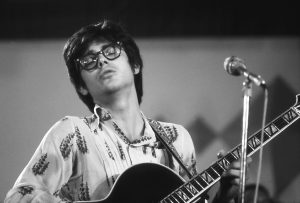 Do you have happy memories of the Royal Albert Hall show you played with John McLaughlin and Paco De Lucia in 1979?
Do you have happy memories of the Royal Albert Hall show you played with John McLaughlin and Paco De Lucia in 1979?
Yes. That was a very nice concert. I am especially fond of this concert even more today, because we have lost Paco. Paco is no longer with us. I haven’t seen John in a long time but I hope I meet him and maybe we can play together.
Do you remember the great concert you played at the Anderson Theater in New York City in 1972 opening for Captain Beefheart & The Magic Band?
Yes, I do (laughs)! How did you know about that?
There is a page about that show on the Internet! Firstly, I found a poster from that show. The guitar player of Captain Beefheart said that you told them: “Hey you Beefheart guys, what’s goin’ on? Let’s go out and play some music”.
Wow!! That was history! Exactly! Exactly! That was fantastic, especially the work Steve Marcus did on saxophone that night.
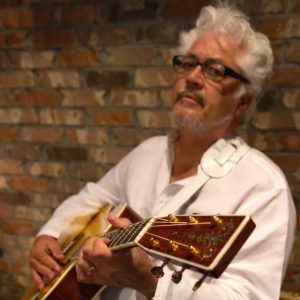 How emotional was to write your autobiography “Improvising: My Life in Music”, published in 2007?
How emotional was to write your autobiography “Improvising: My Life in Music”, published in 2007?
It was very emotional but it needed to be done and I tried to be honest and tell the truth and not to make myself look special. When I wrote this book, I just wanted the people who would read this to understand what was going on in the heart and mind of a jazz musician and all the things he was going through for the sake of the music. Always for the sake of the music.
Was it an interesting experience for you to play on Charles Mingus’ “Three or Four Shades of Blues” album in 1977?
Yes, that was one of the highlights of my life. When I was coming to New York, I strongly wanted to somehow make a connection with Charles Mingus and I was able to do that when I found out about that session. Originally, I wasn’t chosen for being on that record. But I spoke with Atlantic Records and I said: “You have to let me play on this record. I love Charles Mingus so much and I want to show my respect for him and play my heart out for him”.
Who are your influences as a guitar player?
Wes Montgomery, Tal Farlow, Charles Smith, B.B King and Jimi Hendrix.
In the ’60s you listened to The Beatles. How much popular music has influenced your playing style?
A lot of the standards that jazz musicians have been playing over the years were originally popular music made for Broadway shows or maybe for films. Things like “All the Things You Are” (1939), “All of Me” (1931) and “Laura” (1945). The Beatles were our generation’s version of popular music and just like the aforementioned compositions, many of The Beatles compositions’ forms are very good for improvising. Especially “Yesterday”, “She’s Leaving Home” and the one that George Harrison wrote, “Something”. I chose something like that because they have a good form, there were good changes.
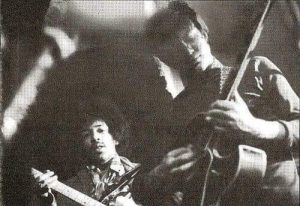 How did it happen to play with Jimi Hendrix?
How did it happen to play with Jimi Hendrix?
It was just an accident because during that time I was living in New York and Jimi had recently moved to New York and there was a very open-minded music club in Midtown Manhattan on 46th Street, called The Scene. All the musicians that were in that town, were converging on The Scene, in order to go and hear the latest music in the pop world and the music world and also, to talk shop. It was a good meeting place. And Jimi Hendrix loved to come there and jam. My wife (ed: Julie) and I, were hanging out with Jimi Hendrix a lot at that time and we were just lovely enough to have him play some bass when I was playing my guitar and we had a nice chance.
Can you explain to us why the first time you listened to Miles Davis’ “Sketches of Spain” (1960) album, you thought it was out of tune?
Yes, I didn’t have a very sophisticated ear. I had only listened to limited types of music like popular music I heard on the radio. I really didn’t understand about using chord tones that Miles was doing. I needed someone who was a better musician than myself and more familiar with jazz music from Spain, that’s the way Miles wanted to sound. When I went back and listened to it again, it made sense.
You did an amazing interview with Stevie Ray Vaughan in 1989. How was it like to talk with Stevie about guitar players?
Oh, that was a great experience! Of course, Stevie was an expert on guitar players, especially blues guitar players. Especially Hendrix and Albert King. But more than that, Stevie Ray Vaughan, he was going through a time in his life where as a human being he was developing a very strong spirituality. And that really made the biggest impression on me. The cross of his personality and the kind of man that he was, showed a great combo and a spiritually strong man. While we were speaking, I realized that he thought he was talking to Larry Carlton.
Do you believe that social media like Youtube and Facebook have helped younger listeners to learn about you music?
Yes. The social media especially Youtube and Facebook, it’s a good way to do business. But Youtube and Facebook don’t do everything. Nowadays, especially for the younger musicians the time is very hard to get themselves into a business situation. They can’t make everything work well on the business. It’s more difficult in these days.
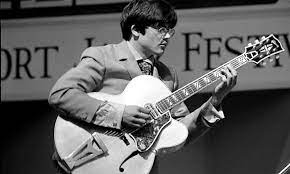 Tony Williams came out from Boston and joined Miles Davis when he was 17 years old. Are there those kinds of opportunities today?
Tony Williams came out from Boston and joined Miles Davis when he was 17 years old. Are there those kinds of opportunities today?
Wow, that’s a good question! That’s a very good question. I would say: “Yes”. I would like to think that there are those opportunities still today, because jazz music is still jazz music. There are so millions and millions of people who are interested in jazz to fill their soul and especially a young player can come forward, like Tony did and joined Miles. That was very big news. That was a refreshing thing that happened. He came out from Boston and played the drums like nobody else ever played in jazz. Always, young players can come in, converging and they can keep playing. They can come in, learn to play their instrument and start performing. One of my students, 18, has already started to do that. I have another student, who is 22, and I think she is going to be a big star. She just started to know how good she is.
Do you think concerts are more important than studio albums?
The money that you can earn from a studio album is apparently much less now than has been in the past. There is a better chance to earn money by playing live, whether you play in a club or a music hall, where music gets played.
Have you ever turned down an interesting work offer, because you were busy or for any other reason?
Oh, yes. I had to turn down an invitation to the first Crossroads Festival that Eric Clapton did, about 15 or 20 years ago. They invited me for the very first Crossroads in Chicago and I had already made a commitment to play in the Canary Islands with John Abercrombie and Badi Assad and I didn’t want to abandon my partners, but I’ve been kicking myself ever since (laughs)! That was also a good question. These things happen. You have to make a decision and you never really know if this is the right one.
You have played with almost everybody. Who is the most talented musician you have seen in your life?
Oh! Off the top of my head? The most talented musician I’ve seen in my life, there are two of them… Three of them. Chick Corea, Keith Jarrett, Herbie Hancock.
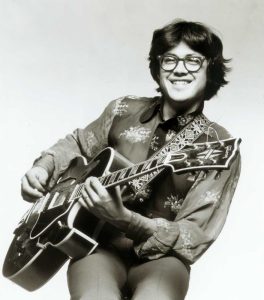 Had you ever played with Jaco Pastorius?
Had you ever played with Jaco Pastorius?
I never had that opportunity and I regret that very much. Jaco changed the direction of the music. His talent was so powerful, so far-reaching. He definitely changed the way the bass is played.
Hope to meet you soon in Greece.
Efharisto (ed: “Thank you” in Greek). I am sure I will be in your country soon. I can feel it.
A huge “THANK YOU” to Mr Larry Coryell for his time to Tracey Coryell for her valuable help.
Official Larry Coryell website: www.larrycoryell.net
Official Larry Coryell Facebook page: www.facebook.com/Coryell.Larry

